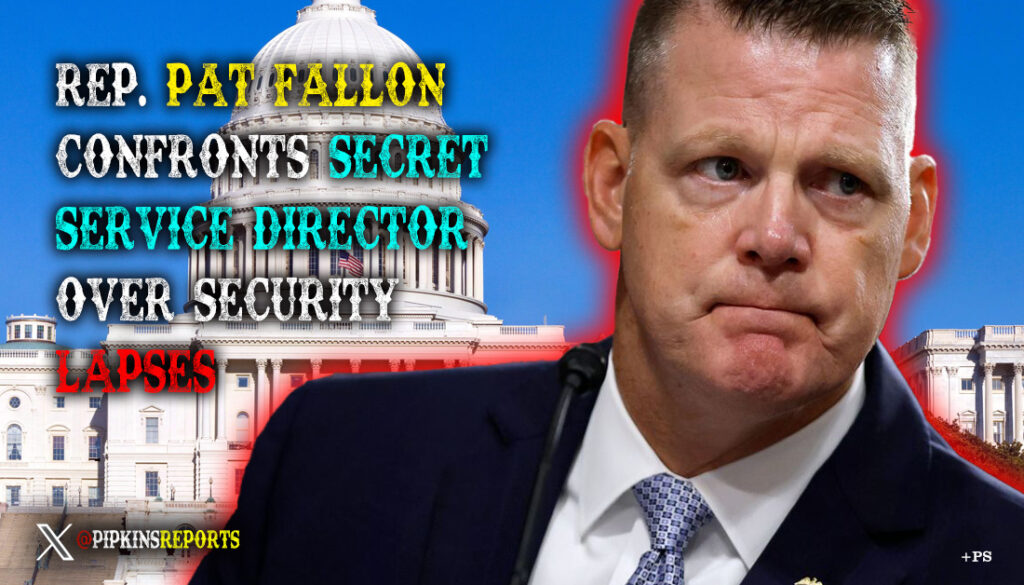Washington, D.C. — A congressional hearing turned fiery when Texas Republican Rep. Pat Fallon clashed with acting Secret Service Director Ronald Rowe over the agency’s recent controversies and alleged politicization of its operations. The bipartisan task force, investigating assassination attempts on President-elect Donald Trump, convened to scrutinize security failures, but tensions escalated as Fallon accused Rowe of neglecting his duties during a high-profile 9/11 memorial event.
At the heart of the confrontation was a photo of Rowe at the memorial, standing in close proximity to Vice President Kamala Harris, President Joe Biden, and Vice President-elect J.D. Vance. Fallon pointedly questioned whether Rowe’s position compromised the protective detail for Trump, who was also present at the event in New York City.
“Who is usually, at an event like this, closest to the president of the United States, security-wise?” Fallon asked Rowe.
Rowe, deflecting from directly addressing his own role, stated that the special agent in charge (SAC) is typically positioned closest to the president. However, Fallon pressed further, asking if Rowe himself was acting as the SAC during the event. Rowe avoided a clear response, asserting that he attended to honor Secret Service members who perished on September 11, 2001.
Accusations of Politicization
Fallon, a staunch advocate for transparency and accountability within federal agencies, challenged Rowe’s motives for attending the event. He suggested Rowe’s presence near high-profile political figures might signal aspirations to secure a permanent appointment as Secret Service director under the Biden administration.
“This isn’t about showing respect for the fallen,” Fallon said. “You endangered lives—those of President Biden, Vice President Harris, and President-elect Trump—by misaligning your agents. This was a political audition, plain and simple.”
Rowe, visibly agitated, pushed back against Fallon’s assertions, calling them “out of line.” The acting director defended his record, emphasizing his service at Ground Zero after the 9/11 attacks and accusing Fallon of politicizing the tragedy.
“Do not invoke 9/11 for political purposes,” Rowe retorted, raising his voice.
Fallon fired back, refusing to back down. “Don’t try to bully me. I am an elected member of Congress, and I am asking serious questions. You’re playing politics and failing in your duties.”
Fallout from Security Failures
The confrontation comes on the heels of a major scandal for the Secret Service. On July 13, a gunman, Thomas Matthew Crooks, managed to access a rooftop near a campaign rally in Butler, Pennsylvania, and opened fire. President-elect Trump was wounded in the attack, along with two attendees, one of whom later died. The incident highlighted glaring security lapses within the agency, prompting the resignation of former Secret Service Director Kimberly Cheatle.
Rowe, who was appointed as acting director following Cheatle’s departure, admitted to failures during the hearing. “July 13 was a failure of the Secret Service to adequately secure the Butler Farm Show site and protect President-elect Trump,” Rowe stated in his opening remarks. “We did not meet the expectations of the American public, Congress, or our protectees.”
Despite acknowledging these shortcomings, Rowe’s testimony did little to assure lawmakers, particularly Fallon, that the agency had learned from its mistakes. The congressman lambasted Rowe for what he described as a pattern of political maneuvering and lack of accountability.
A Texas Voice for Accountability
For Fallon, a representative known for his commitment to constitutional principles and government transparency, the stakes of the hearing went beyond partisan politics. The Texas congressman argued that the Secret Service’s apparent politicization poses a direct threat to national security.
“This isn’t about partisan loyalty—it’s about whether the American people can trust their government to safeguard their leaders,” Fallon stated after the hearing. “When those in power prioritize personal ambitions over their sworn duties, we all lose.”
Rowe’s future as acting director appears uncertain, with the task force’s findings expected to heavily influence Trump’s eventual nomination of a permanent Secret Service director. As the investigation continues, Fallon has vowed to hold the agency accountable, underscoring the need for reforms that prioritize safety over politics.
The clash between Fallon and Rowe encapsulates broader concerns about trust and integrity within federal agencies, a pressing issue for many Americans—and a rallying cry for constitutional conservatives demanding accountability in Washington.
